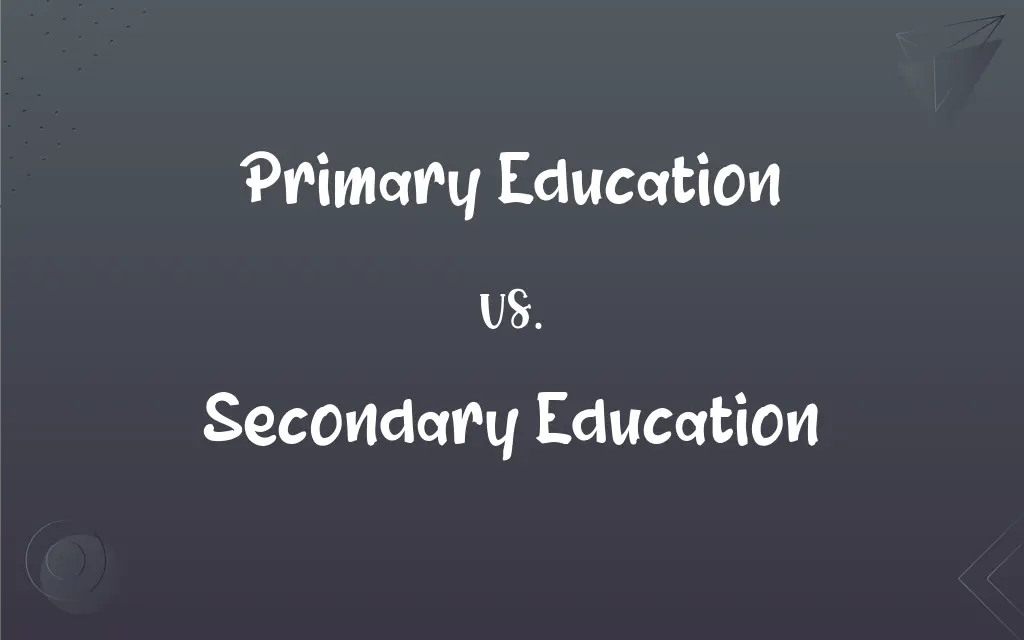Primary Education vs. Secondary Education: What's the Difference?
Edited by Aimie Carlson || By Janet White || Published on November 14, 2023
Primary Education: Foundational schooling for young children. Secondary Education: Education following primary, typically for teenagers.

Key Differences
Primary Education serves as the foundational phase, introducing basic skills. Secondary Education builds on these foundations, offering more specialized knowledge.
Primary Education often covers basic literacy and numeracy. Secondary Education delves into detailed subjects like algebra or literature.
In Primary Education, one teacher may cover multiple subjects. In Secondary Education, different teachers often specialize in specific subjects.
Primary Education is typically for children aged 5 to 11. Secondary Education is usually for ages 12 to 18.
Primary Education fosters basic social skills. Secondary Education often focuses on preparing students for higher education or careers.
ADVERTISEMENT
Comparison Chart
Age Group
Typically ages 5-11
Usually ages 12-18
Curriculum Focus
Basic literacy, numeracy
Specialized subjects, detailed knowledge
Teaching Method
One teacher, multiple subjects
Different teachers for specific subjects
Purpose
Foundational learning
Preparation for higher education/careers
Skill Development
Basic social skills, fundamentals
Advanced skills, critical thinking
ADVERTISEMENT
Primary Education and Secondary Education Definitions
Primary Education
Initial stage of formal education.
Primary education lays the groundwork for future learning.
Secondary Education
Advanced academic phase.
Secondary education prepares students for college.
Primary Education
Foundation for literacy and numeracy.
He learned to read and write in primary education.
Secondary Education
Specialized subject learning.
Secondary education allowed her to study art deeply.
Primary Education
Schooling for young children.
Her primary education was in a local public school.
Secondary Education
Pre-university education level.
He completed his secondary education with honors.
Primary Education
Basic educational phase.
Primary education is crucial for a child’s development.
Secondary Education
Schooling for teenagers.
His secondary education focused on science subjects.
Primary Education
Introductory academic experience.
Primary education introduces children to structured learning.
Secondary Education
Education after primary school.
She excelled during her secondary education.
FAQs
What is primary education?
The initial stage of formal schooling.
What ages does secondary education cover?
Typically ages 12 to 18.
What skills are developed in primary education?
Basic social skills and fundamental learning.
What is secondary education?
Education following primary, often more specialized.
Do teachers specialize in secondary education?
Yes, often in specific subjects.
Are teachers specialized in primary education?
Usually, one teacher covers multiple subjects.
Is secondary education mandatory?
Often up to a certain age, varies by country.
At what age does primary education start?
Usually around age 5.
What is taught in primary education?
Basic literacy, numeracy, and foundational knowledge.
What subjects are in secondary education?
More specialized subjects, such as biology or history.
How long does secondary education last?
Usually 6 years, but varies.
What follows primary education?
Secondary education.
Do students take exams in primary education?
Basic assessments, but less intense than secondary.
Are exams a key part of secondary education?
Yes, often determining higher education opportunities.
How long is primary education?
Typically around 6 years.
Are extracurricular activities part of primary education?
Often, but less varied than in secondary education.
Is primary education compulsory?
In many countries, yes.
Are extracurricular activities common in secondary education?
Yes, ranging from sports to arts.
What does secondary education focus on?
Preparing for higher education and career paths.
What comes after secondary education?
Higher education or vocational training.
About Author
Written by
Janet WhiteJanet White has been an esteemed writer and blogger for Difference Wiki. Holding a Master's degree in Science and Medical Journalism from the prestigious Boston University, she has consistently demonstrated her expertise and passion for her field. When she's not immersed in her work, Janet relishes her time exercising, delving into a good book, and cherishing moments with friends and family.
Edited by
Aimie CarlsonAimie Carlson, holding a master's degree in English literature, is a fervent English language enthusiast. She lends her writing talents to Difference Wiki, a prominent website that specializes in comparisons, offering readers insightful analyses that both captivate and inform.






































































